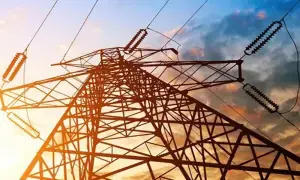KSE-100 recovers marginally after falling 2,000 points
3 min readThe KSE-100 Index plummeted over 2,000 points in less than 20 minutes between 11:40 and noon on Friday, as the market witnessed panic selling after Prime Minister Shehbaz Sharif announced a massive super tax or poverty alleviation tax on large industries in his “bid to relieve the general public of tax pressures”.
However, as clarity emerged that the government intends to impose it as a one-time levy, stocks gradually recovered. At close, the KSE-100 Index settled at 41,051.79, still a fall of 1,665.18 points or 3.9%. On a day-to-day basis, it is the highest decline since December 2, 2021 (-4.7% DoD).
On a weekly basis, the benchmark index lost 2.58%.
Meanwhile, sectors on which the super tax has been imposed include cement, steel, sugar, oil and gas, fertiliser, LNG terminal, textile, banks, automobile, tobacco, beverages and chemicals. Since most of these sectors are part of the listed companies on the PSX, investors hurriedly rushed to sell their holdings, in a bid to conserve their capital.
At the mid-break, the KSE-100 was placed at 40,661.59, a massive fall of 2,055.38 points or 4.81%.
“The market reacted to PM Shehbaz’s announcement on imposition of super tax on the industries,” Sana Tawfik, vice-president research and a senior analyst at Arif Habib Limited (AHL), told Business Recorder.
The analyst, however, remained optimistic as there are a number of positive developments in the offing.
“The International Monetary Fund (IMF) programme could be revived in the coming days, and $2.3 billion inflows from China are also expected shortly, which would revive confidence in the market.
“The current account deficit figures will also impact market sentiment,” she added.
Meanwhile, the government’s measure can result in additional tax collection of Rs250-300 billion for the government, said Topline Securities. “This may help in achieving the revenue and deficit target set by IMF,” it added.
The brokerage house further said though this move will affect company profitability for the current year, “we believe that the valuation is still attractive. Market after this measure is trading at a PE of 4-5x.”
In another major economic development, the finance minister informed State Bank of Pakistan (SBP) received $2.3 billion in loan from China that would help prop up the waning foreign exchange reserves of Pakistan.
Meanwhile, sectors dragging the benchmark index lower included banking (404.90 points), oil and gas exploration (220.06 points) and fertiliser (204.99 points).
Volume on the all-share index increased to 424.23 million from 349.5 million on Thursday. The value of shares traded also increased to Rs12.81 billion from Rs10.14 billion recorded in the previous session.
K-Electric Limited was the volume leader with 36.67 million shares, followed by Cnergyico PK with 25.85 million shares, and Pak Refinery with 25.3 million shares.
Shares of 364 companies were traded on Friday, of which 61 registered an increase, 287 recorded a fall, and 16 remained unchanged.
The story was originally published in Business Recorder on June 24, 2022.
For the latest news, follow us on Twitter @Aaj_Urdu. We are also on Facebook, Instagram and YouTube.



























Comments are closed on this story.